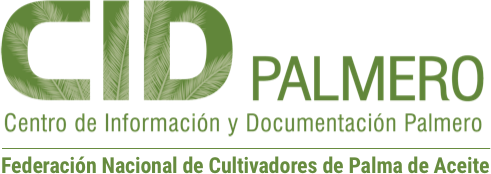| dc.creator | Dumortier, F.
44254,
autor.
aut | |
| dc.creator | Lim, T. K.
41559. | |
| dc.creator | Lord, S.
41560. | |
| dc.date | [2003] | |
| dc.description | The sustainability of the oil palm industry not only requires the availability of high quality planting material but also its continuous improvement to remain competitive. The short-term continuous improvement relies on large scale intensive progeny testing of pisifera and dura to estimate their combining abilities, allowing the exclusive selection of proven pisifera for seed production, and the multiplication of improved dura parents for the creation of new seed gardens. The long-term improvemente requires the widening of the genetic base of the base populations to sustain progress. The paper describes the germplasm sources developed at Dami in various breeding programs and the strategy followed to evaluate, multiply and incorporate these new germpalm into the breeding program. Selection of palms for seed production relies on strict selection criteria, based on progeny testing results as well as familiy and individual phenotypes. Seed production procedures focus on achieving high productivity from selected palms yo maintain high selection intesity. Blank pollinations and other stringent quality control guarantee extremely high levels of seed purity. The seed production unit is organized in a way which guarantees full traceability of all Dami seed and the NBPOL nursery and field planting procedures have been modified to maintain the pedigree integrity in the plantations. The resulting large-scale planting by identified progenies offers new opportunities for research and will help to select progenies better adapted to particular environments. | |
| dc.description | Incluye referencias bibliográficas. | |
| dc.description | The sustainability of the oil palm industry not only requires the availability of high quality planting material but also its continuous improvement to remain competitive. The short-term continuous improvement relies on large scale intensive progeny testing of pisifera and dura to estimate their combining abilities, allowing the exclusive selection of proven pisifera for seed production, and the multiplication of improved dura parents for the creation of new seed gardens. The long-term improvemente requires the widening of the genetic base of the base populations to sustain progress. The paper describes the germplasm sources developed at Dami in various breeding programs and the strategy followed to evaluate, multiply and incorporate these new germpalm into the breeding program. Selection of palms for seed production relies on strict selection criteria, based on progeny testing results as well as familiy and individual phenotypes. Seed production procedures focus on achieving high productivity from selected palms yo maintain high selection intesity. Blank pollinations and other stringent quality control guarantee extremely high levels of seed purity. The seed production unit is organized in a way which guarantees full traceability of all Dami seed and the NBPOL nursery and field planting procedures have been modified to maintain the pedigree integrity in the plantations. The resulting large-scale planting by identified progenies offers new opportunities for research and will help to select progenies better adapted to particular environments. | |
| dc.language | ng | |
| dc.publisher | Papua New Guinea : [Publisher not identified], | |
| dc.subject | DAMI | |
| dc.subject | Semilla. | |
| dc.subject | Papua Nueva Guinea | |
| dc.subject | Palma de aceite | |
| dc.title | Ensuring the continuous improvement and quality of Dami seeds. | |
| dc.type | text | |


